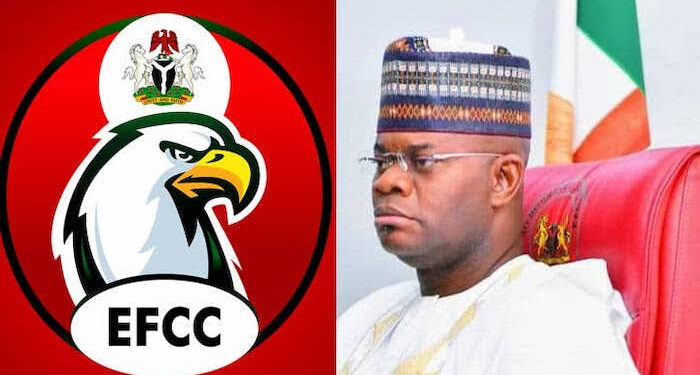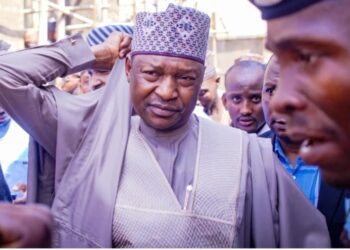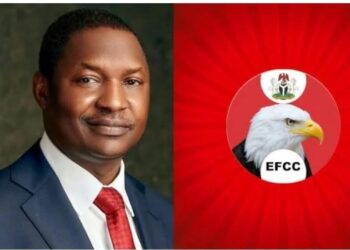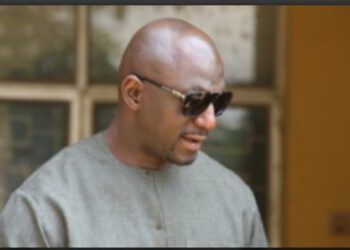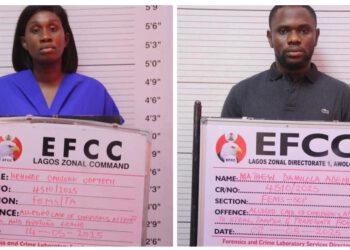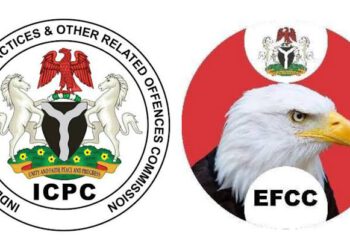By Yusuf Mohammed
Yahaya Bello needs no introduction at this point as there have been countless news stories via the social and traditional media about his macabre dance with the Economic and Financial Crimes Commission (EFCC).
I am open to correction if anyone thinks I am wrong. I do not think that in the history of EFCC’s pursuit of former public officials for alleged corruption, anyone has given the commission as much headache or trouble as the ‘’White Lion.’’
The former governor’s resolve not to be apprehended by the anti-graft agency reminds me of my childhood days. As a kid, I used to fight tooth and nail whenever it was time to go to primary school. Not even the long holidays could do the magic. It was always a tug of war between me and those who tried to force me into a vehicle to join my siblings. But my will not to go was weightier. Sometimes they gave up. And my mum remarked one day that: ‘’School isn’t a death sentence: why is this boy struggling with all his strength to avoid it?’’ She then decided to follow me to know if there’s a bogeyman in school I was afraid of. The next day, with the support of my dad, she persuaded me and followed me to school.
I guess Ododo could be telling Bello something similar to what my mum said. ‘’Bros this thing no be death sentence. U no see other governors dey go. No worry, I go follow you.’’ I guess we should give the current governor the benefit of doubt. He could just be playing the role of a guardian like my mum and dad did with me as a kid.
And if I were Ododo, I would go further by letting Bello know that there are many examples he should take a cue from as far as making himself available to the court and the EFCC is concerned. One of them, which is the most recent of all, is his counterpart, Darius Dickson Ishaku, who turned himself in without drama.
Speaking of Ishaku, about two weeks ago, at the end of a hard day’s job, I decided to cool off in a nice restaurant and lounge. What was on the news that evening was the arraignment the immediate past governor of Taraba, Ishaku and former permanent secretary, Bureau for Local Government and Chieftaincy Affairs in the state, Bello Yero, before Justice S. C Oriji of the Federal Capital Territory High Court, Maitama, Abuja for fraud.
Both of them are being prosecuted on a 15-count charge, bordering on criminal breach of trust, conspiracy and conversion of public funds to the tune of N27 billion while in office. That is like a quarter of what Bello is being accused of looting.
Some men who were seated close to the TV with plates of pepper soup before them, remarked that ‘’how come Bello from the onset refused to turn himself in like this Taraba man?’’ That is a million dollar question that only Bello himself has the answer to. He has given room for insinuations and speculations. Could it be that the larger than life image his minions carved for him has gotten his ego so bloated that the thought of being arrested by the EFCC would deflate it?
I implore Ododo to remind his predecessor that since the EFCC was created by Olusegun Obasanjo in 2003, many big fishes have landed in their net without much drama or hassle.
One of his senior colleagues, Ayodele Fayose aka Peter the Rock, is being prosecuted by the EFCC for alleged N6.9 billion fraud and money laundering. The case, according to reports, started in 2014 when Fayose and one Abiodun Agbele were believed to have taken possession of N1.2 billion to fund his gubernatorial election campaign in Ekiti State. As controversial and irrepressible as Fayose is, his case didn’t draw attention like Bello’s own.
Former Anambra governor, Willie Obiano who was known for demolishing ‘’illegal structures’’ was arraigned earlier this year by the commission before a federal high court in Abuja bordering on illegal transfer of funds, stealing, and corruption amounting to N4 billion.
The judge in charge of Obiano’s case ordered that his passport and travel documents be kept in the custody of the court and that the Nigeria Immigration Service (NIS) be notified of the arrangements. All hell did not break loose.
Former governor of Sokoto State, Attahiru Bafarawa was accused of misappropriating and embezzling N15 billion during his time. Later, he was discharged and acquitted of the charges by a Sokoto State high court.
However, in January 2024, a second witness in the trial said the former governor diverted N4.6 billion he received as a security fund from the office of Sambo Dasuki, the former national security adviser (NSA).
The anti-corruption agency is now prosecuting Bafarawa on amended 25-count charges bordering on criminal breach of trust and diversion of public funds.
Abdulfatah Ahmed, a former governor of Kwara State, has been interrogated several times by the EFCC on how a sum of N3 billion was spent when he was at the helm of affairs.
In December 2020, he was at the commission’s office in Ilorin to clarify certain transactions and decisions he took as governor. In May 2021, he was grilled at the EFCC headquarters in Abuja over allegations of fraud.
In February 2024, the former governor was arraigned on a 12-count charge bordering on alleged mismanagement of N10 billion in public funds. Heavens did not fall.
In 2015, the EFCC reopened a 42-count charge against Timipre Sylva, former Bayelsa governor and former minister of state for petroleum resources, for allegedly stealing the state fund between 2007 and 2011.
Also in 2015, the EFCC charged former Jigawa State governor, Sule Lamido and two of his sons, Aminu and Mustapha. They faced 37 amended charges bordering on money laundering until the case was thrown out.
A former Plateau State governor, Joshua Dariye was sentenced to 14 years in prison for criminal breach of trust and two years for misappropriation of public funds, to run concurrently.
He was released from the correctional facility in the Kuje council area of the federal capital territory (FCT), on August 8, 2022, after President Muhammadu Buhari pardoned him.
Similarly, Jolly Nyame of Taraba was pardoned by President Buhari in April 2022 after standing trial for 11 years as a result of being charged the EFCC charging him with abuse of office and diversion of 1.64 billion.
Another former governor who received a presidential pardon was late Diepreye Alamieyeseigha. He was impeached as governor in 2005 and later that year, he was arrested by the EFCC and charged with money laundering and corruption offences.
In 2007, Alamieyeseigha pleaded guilty and was sentenced to two years in prison but was released a few hours after his sentence because the sentence started reading from 2005. In 2013, President Goodluck Jonathan granted Alamieyeseigha a state pardon.
The names mentioned above were political heavyweights in their respective rights. None of them troubled the EFCC like Bello is doing. Ododo should prompt Bello to draw inspiration from the fact that in the worst-case scenario, he, like others before him could also be granted a state pardon.


